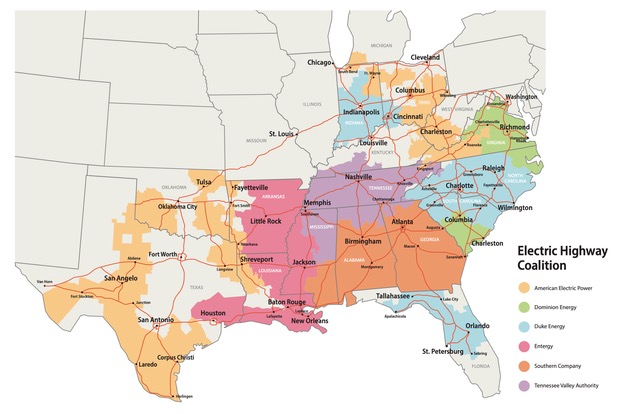Electric vehicle owners energized with plan for multi-state charging stations

Electric vehicle (EV) owners and fleets will be able to hit the highways without worrying about keeping a charge, thanks to a new plan by Tennessee and 15 other Southern and Midwest states to provide a network of DC fast-charging stations along major highways.
This initiative came on the heels of Tennessee’s own project to provide EV travel without interruption, announced in February, to add about 50 new charging stations to the state’s interstates and major highways – one every 50 miles – by the Tennessee Valley Authority (TVA) and the Tennessee Department of Environment and Conservation.
The state plan triples Tennessee’s existing fast-charging network from its current 24 stations operating in the state that are open to all consumers and support both charging standards common to EVs.
Then last month, the multi-state Electric Highway Coalition – made up of TVA and five other utilities – announced an initiative where each utility will provide EV charging solutions within their service territories, allowing EV travel without interruption in 16 states.
The coalition’s network will range from as far north as Chicago and south to Harlingen, Texas, and as far west from Van Horn, Texas, east to Hampton Roads, Va.
Coalition members are determining locations for charging stations, which will provide DC fast chargers capable of getting drivers back on the road in about 20-30 minutes.
Most urban areas – in Tennessee and around the country – already have public and rapid charging stations, but the new highway charging programs are designed to allay “range anxiety” for EV motorists while they’re on trips.
This is one move in TVA’s efforts to reduce barriers that prevent more people from choosing EVs, according to TVA.
Benefits from such a move in TVA’s seven-state service area, according to TVA, could result in:
- $120 million reinvested in the local economy per year from electric refueling.
- $200 million in consumer fuel savings per year.
- Almost 1 million metric tons of CO2 saved per year (or the equivalent of the carbon sequestered by 1 million acres of U.S. forests in one year).
“Together, we can power the electric road trip of tomorrow by ensuring seamless travel across a large region of the U.S,” said Jeff Lyash, TVA president and CEO. “This is one of many strategic partnerships that TVA is building to increase the number of electric vehicles to well over 200,000 in the Tennessee Valley by 2028.”
It’s an ambitious goal; as of December 2020, there were 11,034 light-duty EVs registered in Tennessee.
